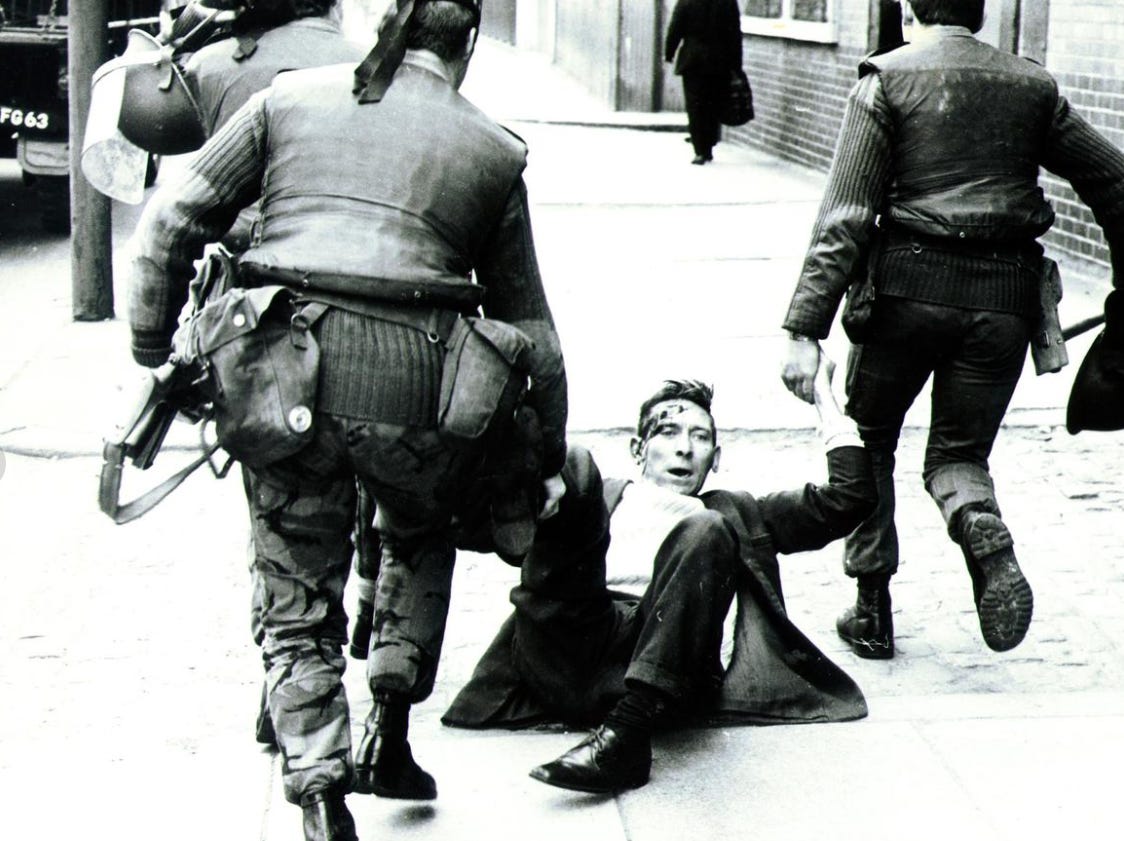Mahmoud Khalil Is Correct About October 7th
Oppression breeds resistance. Liberty brings peace.
Fifty-four years ago today, the British Army rolled into sleeping Catholic neighborhoods across the North of Ireland. Over the next twenty-four hours, Great Britain’s soldiers enacted a staggering wave of state violence. Going house to house, they kicked down the doors of suspected republicans, dragged groggy-eyed prisoners into the street, hooded and beat them before their neighbors, and tossed them in military vans headed to Long Kesh, a draconian prison symbolizing Britain’s brutal 800-year colonization of Ireland. There, the prisoners, who had been seized on mere suspicion of revolutionary sympathies, were deprived of sleep, food, and water before being tortured for information. Some were led to believe they were to be thrown out of helicopters, only to be tossed out and find the vehicles hovering a few feet off the ground — a mock execution designed to strip prisoners of their humanity, breaking them to the point of collaboration.
Operation Demetrius, as this smash-and-grab sweep was codenamed, took place on August 9, 1971. It was the formal reintroduction of internment, a British colonial practice of incarcerating suspected dissidents without trial or conviction. Over the next four years, close to nineteen hundred Irish Catholics were disappeared into Britain’s internationally condemned prisons under the internment policy. The Conservative Party, which led the government at the time, thought iron-fisted repression would splinter the Provisional Irish Republican Army, the leading decolonial paramilitary group fighting for Irish reunification. They were greatly mistaken.
One of the most consistent historical patterns is that when people are denied peaceful means to resolve their political disagreements, they resort to armed resistance, as is their right under international law.1 Blocked from political participation by racist voting laws and unable to defend themselves at trial, many Irish Catholics chose the only path left. Twenty-three people were killed on the night of Operation Demetrius, which triggered a wave of republican paramilitary attacks on the British Army. Further internments and assassinations ensued, from both the uniformed military and several loyalist paramilitaries serving as its proxies. One hundred and fifty people are estimated to have died during the remainder of 1971. The following year was the most violent of the Troubles. Close to five hundred people were killed, with thousands injured and even more fleeing to refugee camps set up across the partitioned border.2
The Irish struggle is a helpful example to understand the situation in Palestine. Both scenarios saw a powerful nation enacting settler colonialism on the indigenous population, seizing inhabitants’ land and subjugating them with claims of religious and racial inferiority. With near-identical colonization practices, the Irish and Palestinian decolonial resistance movements took similar form. In both Ireland and Palestine, colonial subjects fought back with strategies that combined civil disobedience, political participation (when possible), and militarism. In both locations, as well as countless other colonized regions, the pattern of violence followed history’s trend: the occupying government gave its subjects no peaceful resolutions, so they turned to military options. This tendency is consistent, predictable, and understandable. After all, the right to ‘alter or abolish’ tyrannical governments is the founding principle of the United States and is deeply ingrained in the modern American psyche. Despite the profound role political violence plays in the American founding, the patterns of oppression fostering such violence are entirely omitted from the discussions of the October 7th attacks, where all context is stripped in favor of the State Department’s preferred narrative. This was demonstrated in a recent high-profile interview with political prisoner Mahmoud Khalil, conducted by New York Times columnist Ezra Klein. Inquiring about Khalil’s pro-Palestinian activism that eventually saw him illegally incarcerated (one could argue he was interned) by the American government, Klein asked Khalil about the now-infamous day.3



